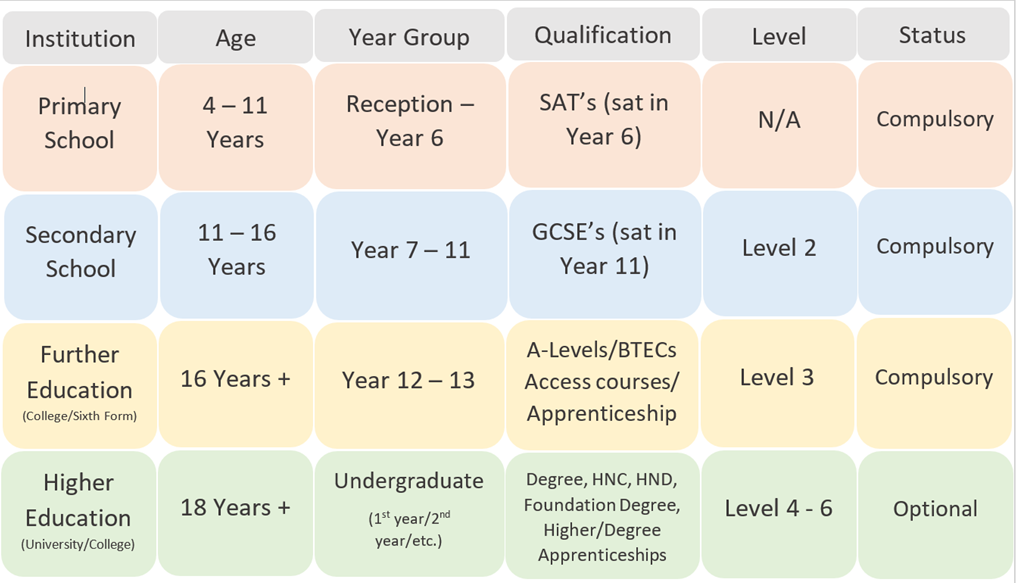
How do I get into higher education?
First, let’s think about what stage you’re at now. You’re currently doing your GCSEs. Once you’ve completed these, you’ll progress into further education. Then after you’ve completed your further education, you’ll have the opportunity to continue your studies in Higher Education. Don’t worry if you’re still a little confused. Check out our progression chart to see where you are now and what the next steps will be for you.

Life After 16
You’ll hear a lot of new terms over the next few years relating to the different qualifications that you can take at sixth form or college. Then there will be even more new terms when it comes to applying to university. To makes things easier for you, we’ve picked out some of the essential words and phrases that we know you’ll be hearing a lot over the next few years.
Level 3 Qualifications:
- A-level – An academic qualification in a specific subject that is studied full-time over two years. Students often choose three or more subjects, and are mainly assessed through written exams. A-levels are accepted by all universities and apprenticeship providers.
- BTECs and other diplomas – A specialist work-related (vocational) qualification that can be studied full-time over two years. They often suit ‘practical learners’ i.e., people who learn by ‘doing’ since they combine practical learning with subject and theory content. They’re assessed by a combination of coursework and exams. Not all universities accept BTECs; and you may be expected to take one or more A-levels alongside a BTEC too. Make sure to look into the course and grade requirements for different courses at university to see if they accept BTECs.
- T-level – A new technical programme for 16-19 year olds, which is a new qualification for young people who want to specialise in a specific industry or prepare for a particular job. As opposed to apprentices who spend most of their time learning on the job, a T-level student will spend most of their time in the classroom learning technical skills.
- Advanced Apprenticeship – Advanced apprenticeships are generally considered equivalent to 2 A-level passes. Apprentices work towards a qualification in a sixth form/FE college while also working for roughly 30 hours a week in paid employment. Entry requirements vary but you generally need at least five GCSEs with grades 9-4.
Applying to HE:
- UCAS – UCAS stands for ‘Universities and Colleges Admissions Service’. It is the organisation that manages application to higher education courses in the UK. In the final year of college/sixth form, students who are applying to study an undergraduate degree at universities or colleges will fill out a UCAS form online where they provide information about themselves, and apply for up to five higher education courses
- Personal statement – A personal statement supports your application to study at a university or college. It’s your chance to tell admissions staff why you’d like to study a particular course or subject, and what skills and experience you have that show your passion for your chosen field
- Prospectus – These are guides produced by universities that detail all of the courses that a university offers. It gives information such as entry requirements, course structure and extra support offered. It also includes general but crucial information about the university such as where it is located and the facilities that the university provides.
- Conditional offer – When universities review your UCAS application, they decide what kind of offer to make you. Assuming that you’re successful, you will probably be made a conditional offer which means that you’ll need to meet their requirements to gain a place – this is usually based on your exam results. You may receive conditional offers from multiple universities. If this is the case then you can select a ‘firm choice’ (e.g., first choice university) and an ‘insurance choice’ university (e.g., second choice university) just in case you don’t meet the conditional requirements of your firm choice!
- Unconditional offer – Sometimes, students will be offered unconditional offers. This means that as you have already met the entry requirements, the university or HE institution is offering you a place at the university without any additional requirements needing to be met- such as in a conditional offer. These are much more uncommon and by accepting an unconditional offer you are fully committing to attending that institution, meaning that you cannot choose an ‘insurance’ university.
- Contextual data offer – Contextual data is additional information that is taken into consideration by admissions teams at universities alongside a UCAS form. In cases where applicants have faced certain disadvantages, universities may provide a variety of different offers to help you succeed, including lower entry requirements (e.g. ABB instead of AAB).
Remember – we’ve also got our glossary page so make sure you use it if there’s ever anything you don’t quite understand! Click here to view our Jargon Buster.
You now know more about the journey to HE and hopefully, you are feeling more prepared to make future choices. Make sure to check out the links below for even more HE information.
How can I afford HE?
Money can be a scary topic but it doesn’t have to be! Explore student finance in this next section.
Why Study?
Why not check out our Why Study? page to find out what our students really think about their courses and about student life.
Visit the University of Manchester's Why Study? page!
